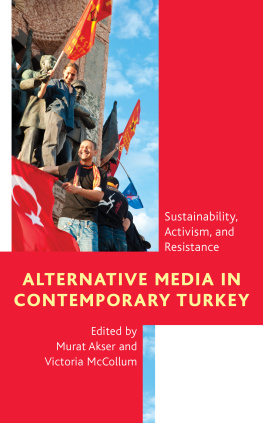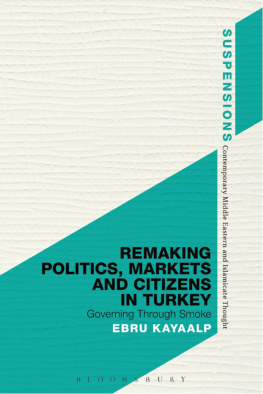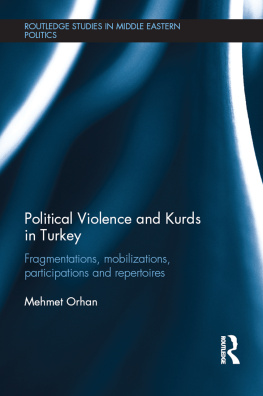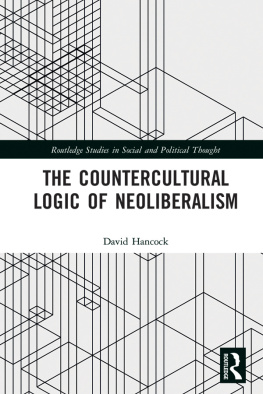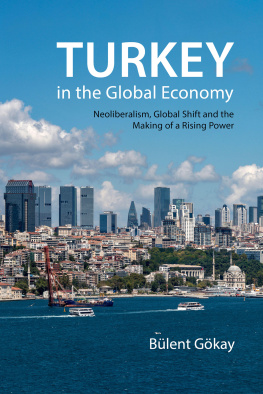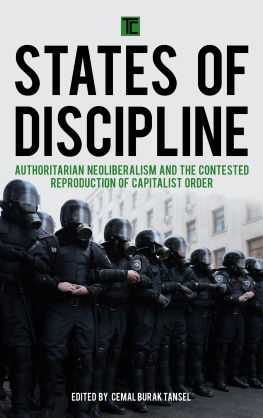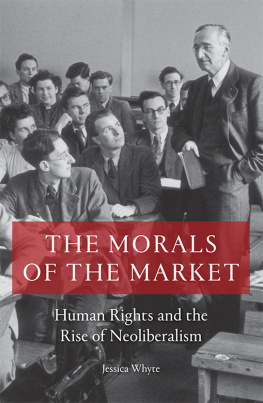
Fatma Mge Gek is Professor of Sociology and Women's Studies at the University of Michigan. Her research analyzes the impact of processes such as development, nationalism, religious movements and collective violence on minorities. Her recently published books include Social Constructions of Nationalism in the Middle East (2002), The Transformation of Turkey: Redefining State and Society from the Ottoman Empire to the Modern Era (2011) and Denial of Violence: Ottoman Past, Turkish Present and the Collective Violence against the Armenians, 17892009 (2015). She has also co-edited A Question of Genocide: Armenians and Turks at the End of the Ottoman Empire (2011) and has contributed to a variety of books and journals.
This is an inspiring collection examining the logic and the consequences of neo-liberal authoritarianism and its historical roots.
Kerem ktem, Professor for Southeast European Studies
and Modern Turkey, University of Graz
Contested Spaces in Contemporary Turkey brings together diverse perspectives offering significant insights into fast-moving but historically based changes in cities and rural areas across the country.
Susan Pattie, Honorary Senior Research Associate,
University College London

Published in 2018 by
I.B.Tauris & Co. Ltd
London New York
www.ibtauris.com
Copyright Editorial Selection and Introduction 2018 Fatma Mge Gek
Copyright Individual Chapters 2018 Fikret Adaman, Bengi Akbulut, Ozan Aksoy, Kristen Biehl, Laurent Dissard, Tue Ellialt-Kse, Ryan Gingeras, Zeynep Kal, Pnar Kemerli, Zeynep Kezer, Burak Kse, Sarah Shields, Ceren Soylu, Sarah Thomsen Vierra, Metin Yksel
The right of Fatma Mge Gek to be identified as the editor of this work has been asserted by the editor in accordance with the Copyright, Designs and Patents Act 1988.
All rights reserved. Except for brief quotations in a review, this book, or any part thereof, may not be reproduced, stored in or introduced into a retrieval system, or transmitted, in any form or by any means, electronic, mechanical, photocopying, recording or otherwise, without the prior written permission of the publisher.
Every attempt has been made to gain permission for the use of the images in this book. Any omissions will be rectified in future editions.
References to websites were correct at the time of writing.
Library of Modern Turkey 28
ISBN: 978 1 78453 610 7
eISBN: 978 1 78672 228 7
ePDF: 978 1 78673 228 6
A full CIP record for this book is available from the British Library
A full CIP record is available from the Library of Congress
Library of Congress Catalog Card Number: available
Dedicated to all those fighting for freedom and democracy in Turkey today
Contents
Fatma Mge Gek
Sarah Shields
Zeynep Kezer
Zeynep Kal
Metin Yksel
Ryan Gingeras
Sarah Thomsen Vierra
Tue Ellialt-Kse
Ceren Soylu, Bengi Akbulut and Fikret Adaman
Laurent Dissard
Kristen Biehl
Burak Ksee
Pnar Kemerli
Ozan Aksoy
List of Illustrations
MAPS
The Uluabat Lake Basin (The dotted line denotes the boundaries of the protected area).
Map of stanbul's historical peninsula and district areas.
FIGURES
ankaya Kk shortly after the construction of the new larger residence and office building by Austrian architect Clemens Holzmeister (c. 1930).
Ankara in 1924, at the outset of the Republic. Buildings with relatively larger footprints and in darker shade indicate the incipient growth towards the train station inaugurated in 1893.
Townhouses in Ankara's Hisarn neighborhood in the first decade of the twentieth century.
The Tevonian family sitting by the poolside in front of their estate (c. 1910).
The burned Hisarn district in the early 1920s, with some new construction after Ankara became the capital.
Looking north from Ankara's southern foothills (c. 1935), the gradual transformation of the fabric of the estates is evident.
Aerial view of Ankara's developing administrative quarter, with the ankaya and Dikmen hills in the background. The artery on the left eventually became the new capital's dominant axis, Atatrk Boulevard.
Ankara's transformation under the Republic: republican urban development overtook the agricultural belt surrounding the city's historic core.
Driver's guide to Ankara, 1942. The map comprises the linear axis of development between Ulus and ankaya.
The newly built stanbul Adliye Binasi (stanbul Building of Justice).
Women protesting the injustice in front of the building; the banner in front reads We do not consent to male justice; we rise against it and expose it; we demand severe punishment of rapists.
Munzur River from Halbori Cliffs, lieux de mmoire of 1938 massacres.
Anti-dam protest march from center of Tunceli to the shores of the Munzur River.
Zincirlikuyu, Beikta, stanbul.
Third Bosphorus Bridge, stanbul.
Tarlaba, Beyolu, stanbul.
Aynur. Rewend. Arista Music. 2010.
Tarkan. Uyan. Doa Dernei. 2008.
Location of Hasankeyf.
Ruins of Hasankeyf, sealed off from the public, May 2014.
TABLES
Mobile Village Courses for men.
Mobile Village Courses for women.
Comparison of audiovisual features of Uyan and Rewend.
List of Contributors
Fikret Adaman is currently Professor of Economics at Boazii University, Istanbul, Turkey. He holds a BA and MA in Economics at Boazii University and a Ph.D. in Economics at the University of Manchester. His research interests include alternative economies, ecological economics, history of economy thought, and political economy. His publications have appeared in Antipode, Cambridge Journal of Economics, Conservation Letters, Development and Change, Ecological Economics, Energy Policy, Environmental Politics,New Left Review, and Voluntas. His co-edited book Neoliberal Turkey and its Discontents: Economic Policy and the Environment Under Erdogan has recently been published (I.B.Tauris, 2017).
Bengi Akbulut is currently a professor in the Department of Geography, Planning and Environment at Concordia University, Quebec. She holds a BA in Economics from Boazii University, a Ph.D. in Economics from the University of Massachusetts at Amherst and was a postdoctoral researcher at the School of Environment and Development at the University of Manchester. Her work is situated within the fields of political economy, ecological economics, development studies and feminist economics. Her work has appeared in the Cambridge Journal of Economics, Development and Change, and the Journal of Peasant Studies among others. Most recently she has co-edited a volume on the political ecology of neo-liberal Turkey, Neoliberal Turkey and its Discontents: Economic Policy and the Environment Under Erdogan (I.B.Tauris, 2017).
Ozan Aksoy is an ethnomusicologist with research interests in music, politics, environmental activism, and diaspora, particularly as they pertain to Kurdish communities originally from Turkey. His publications have appeared in


